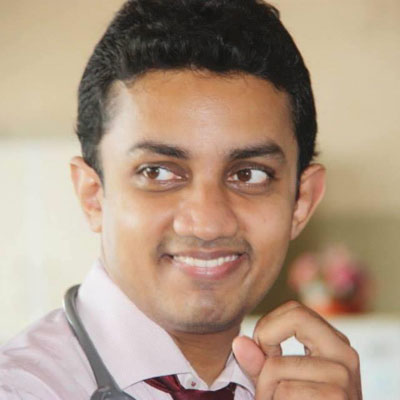News
Hectic schedules and fears of infecting his loved ones
Dr. Sachith Chanaka Wijesiriwardena is at the Royal Adelaide Hospital in Adelaide, Australia, which is a COVID-19 centre for the state.
Working as an Advanced Trainee in General Medicine, he would return to Sri Lanka as a Consultant Physician soon.
It was while enjoying his stay in Adelaide and also the hospital environment that COVID-19 struck.

Dr. Sachith Chanaka Wijesiriwardena
“As of now I personally believe that we have things under control in our area and the hospital is well organised as it is a large one with the most sophisticated ICU in the region and separate rooms for all inpatients,” he says, adding that personal protective equipment has been a matter of concern the world over and they are currently following WHO recommendations.
He explains that N95 masks are only used if the patients are very sick with cough or are undergoing aerosol-generating procedures.
The set-up at this COVID-19 centre is that there are four dedicated COVID teams for the wards and he is acting as a senior in one of them along with cover from a consultant physician.
“We have 4 days of 13-hour shifts and then 4 days off. Quite a hectic schedule though very fair. There is talk of providing hotels for healthcare workers who are worried about transmitting this disease to their loved ones. Not implemented yet. I am here with my wife and six-year-old daughter. I have no issues working in the frontline, but the only worry is the risk of bringing it back home and being in a foreign country,” says Dr. Wijesiriwardena.
Comparing Australia and Sri Lanka, he says that Australia was very complacent at first and not proactive like Sri Lanka. “The Aussies brought it upon themselves and could have controlled this much better is my understanding. The Aussie lifestyle is such that they usually don’t take things like this seriously enough, so I pity the government here as well. They were more worried about the economy.”
It is with pride that he says that he has conveyed to his peers there how well a small country like Sri Lanka responded to this huge challenge and there is a lot to learn from this.
“We need to appreciate the hard working healthcare staff we have in Sri Lanka and concentrate on improving any weaknesses in the system. Luckily South Australia was more vigilant than bigger states like New South Wales and Victoria and closed its borders sooner and was able to contain and trace most of its cases. We are currently seeing a reduction in daily cases, but it could be the calm before the second surge,” he says.
He reiterates that he has wonderful consultants to train under and they are leading the way and being good role models on how to fight this pandemic.
Dr. Wijesiriwardena had been Acting Resident Physician at the National Hospital of Sri Lanka, Colombo, prior to commencing his foreign training in General Medicine.


